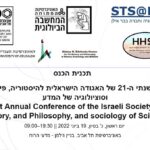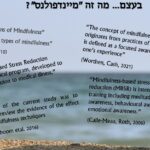This lecture presented the scientific-medical discourse on mindfulness, in which this meditation became an accepted and desirable trend. In order to illustrate the success of mindfulness – a comparison with the status of Transcendental Meditation in the scientific-medical discourse is also presented.
The lecture took placein the session “Science, Religion and Spirituality” (Chairman – Iddo Hartogzhon), at the 21st annual conference of the Israeli Society for the History, Philosophy and Sociology of Science, on June 19, 2022, at Tel Aviv University.
A similar lecture was held at another conference – see links below.
This research takes part both in the research project about the academic discourse and in the research project about the Orient in the West.
Abstract
The tremendous prosperity of mindfulness in contemporary Western culture is manifested everywhere – in medicine, education, prisons and the media. This dissemination is accompanied by a parallel process of the development of an affirmative debate within the medical-scientific discourse, that attests to the perviousness of science to cultural trends. Modern medicine and science established themselves while excluding religious beliefs and spiritual practices. However, in this case we are witnessing the adoption and confirmation of meditation using scientific tools. Furthermore, the success of mindfulness in conquering the medical-scientific discourse is unusual, in comparison to other spiritual practices.
In light of this surprising situation, we examined what are the cultural-social processes that allow the successful acceptance of a spiritual practice by contemporary Western science. In our research, we conducted a comparative analysis of the medical-scientific discourse in recent decades about two meditation methods of Asian origin – Mindfulness and Transcendental Meditation (TM).
The analysis of the medical-scientific discourse included an examination of the development of scientific research and its characteristics with quantitative tools (such as the number of articles and their prestige indices) and qualitative tools (such as the researchers’ personal interest, use of spiritual terms). The quantitative database includes 6180 medical studies published in PubMed between 1970 and 2017, from which a qualitative sample of 50 articles was selected.
The difference in the research discourse is evident in all the indicators. The Mindfulness fad has taken over the scientific discourse, including the most prestigious disciplines (such as neurology), and has received a 60 times greater number of publications and higher prestige indices compared to MT (in mindfulness, IF is weighted 2.5 times as much).
Our research explains a series of reasons for this selective success of meditations of Asian origin, first of all the willingness of Mindfulness’ agents to conduct a massive Westernization of the practice, while detaching it from its original connections and subordinating it to contemporary Western logic (such as detaching it from the religious context and creating a structured protocol for meditators) and scientific language (such as subordinating it to measures of productivity and achievement and adopting a secularized-scientific cosmology).
Our conclusion from this research is, therefore, that we are not witnessing a dramatic revolution in the scientific paradigm, which opens up to the world of religion/spirituality, but rather the opposite: finding the way to “secularize”, “Westnize”, “translate” and adapt the phenomena that were lately perceived as distinctly extra-scientific to the terms which are plausable to westerners. Time will tell if this was a pragmatic way to ultimately bring about a significant change in Western science, or if it was another instance of the West’s cannibalistic ability to appropriate its Others.
Date
June 19th, 2023
Language
Hebrew
Academic/Non-academic
Academic item


















